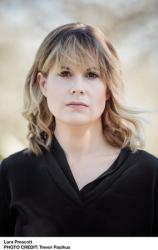The Secrets We Kept
Review
The Secrets We Kept
Following the end of World War II, the world has changed. Allies become deadly, feared and hated enemies. Berlin and Germany are divided not only geographically but also ideologically and economically. The clandestine world of spies and spycraft changes as well, leading up to the Cold War. And the Office of Strategic Services (OSS) becomes the CIA.
Mostly staffed by men, there are the occasional females in the Agency. Recent graduates of Ivy League colleges, hoping to serve their country, are relegated to the typing pool. Other women who had run black ops during the war or smuggled dynamite to allies, regarded by the Nazis as the most dangerous of spies, now sit at typewriters or take dictation. Still, in 1950s America, there are worse jobs. And at least they get to work in the CIA’s Soviet Russia Division, which is certainly more exciting than some of the other government typing positions.
"It’s a fascinating snapshot of danger, life and love, and an exploration of what service to one’s country means to both citizens and governments."
On the other side of the world, in the USSR, Stalin continues to rule the combined Soviet nations. Boris Pasternak, the beloved Soviet poet, is writing what would become his masterwork: DOCTOR ZHIVAGO. This story isn’t just fiction, though; like his titular character, he is married yet also is having an affair. Stalin and his government are worried about the ideas that Pasternak is including in the novel, concerned that it will be anti-socialist. But no one is talking about the contents of the book --- not Pasternak, or his wife, or his lover and muse, Olga Ivinskaya.
So when the government can’t determine what Pasternak is writing about, Olga is arrested and taken to the Lubyanka, the most terrifying government prison in Moscow. Her interrogator asks her repeatedly what the book contains: “What is the novel about? Why is he writing it? Why are you protecting him?” Their greatest fear is that Pasternak is writing anti-Soviet propaganda, and the Soviet people might read it. In actuality, DOCTOR ZHIVAGO is a love story, and Olga will not confess that Pasternak is doing, or writing, anything wrong. Her steadfast devotion to him earns her a sentence: five years in the Gulag.
In Washington, D.C., the CIA has decided that the way to the Soviet people’s hearts, to draw them toward democracy and away from communism, will be most effectively traveled via literature. In fact, the Russians are a highly literate people; Russia is, after all, the nation that produced the captivating written words of Chekhov, Tolstoy and Dostoevsky. The CIA selects several women, one from their typing pool, to aid in this work. Irina Drozdova is a first-generation American whose mother fled the Soviet Union before she was born (her father wasn’t so fortunate as to make it out alive). Irina’s trainer is the glamorous Sally Forrester, who has used her beauty and intelligence to fascinate America’s enemies all over the world, and finds herself captivated by Irina.
Olga, released from the Gulag, returns to her family and her lover, who still hasn’t completed DOCTOR ZHIVAGO. Once he has finished it, though, who in his native country will publish it? Everyone in the Russian writing community and publishing world knows that Pasternak and his book are dangerous property. But perhaps someone outside the Soviet Union will take a chance on it.
THE SECRETS WE KEPT carries the reader through the tumultuous years spanning the beginning of the Cold War, from 1949 to 1961. Debut novelist Lara Prescott beautifully pens the story of three women whose choices and actions affect individuals, nations, even the world. She vividly recreates post-war Washington, Europe and Soviet Russia, and the mores and culture of the ’50s and ’60s. It’s a fascinating snapshot of danger, life and love, and an exploration of what service to one’s country means to both citizens and governments.
Reviewed by Melanie Reynolds on September 20, 2019
The Secrets We Kept
- Publication Date: June 30, 2020
- Genres: Fiction, Historical Fiction, Historical Thriller, Suspense, Thriller
- Paperback: 368 pages
- Publisher: Vintage
- ISBN-10: 0525566104
- ISBN-13: 9780525566106










